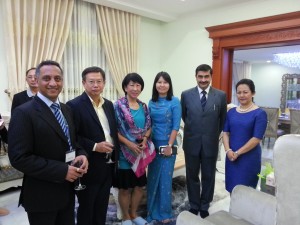So we went to Myanmar for our Business Study Mission (BMS). Considering the other exotic places that previous cohorts visited (cue: Tokyo, Berlin, Copenhagen, etc), Myanmar does not exactly fit into the kind of exotic country that most of us had in mind. Nevertheless, we were looking forward to visit this Asian last frontier economy and see what it can offer.
I shall not bore you with the details of our trips. I mean you can expect the usual company visits, cultural site visits and networking lunches and dinners. And some of us ate the fried crickets over dinner as part of immersion.
But what really strikes me is the warmth and optimism of its people. Almost everyone we met believes their country has turned the corner and things will start to improve from now. There is the young banker who abandons his promising banking career in U.S. to join a Myanmar bank. There is the Singapore-born Australian who is happy that his decision more than 10 years ago to bring his business to Myanmar is starting to pay off and he has proved his early detractors wrong.
Well, after the BSM, I can certainly understand their optimism. Unlike Singapore, Myanmar today is essentially a SME-centric economy. While its economy remains highly fragmented and largely inward-looking, perhaps a consequence of the military junta’s rule previously, it is a cornucopia of exciting opportunities and inadequacies. Almost every business sector you can imagine offers growth or business potential even though the business eco-system is still lacking and resources are struggling to handle the spike in capital influx.
If I am to invest in Myanmar today, I will consider a hospitality training school. As tourism booms and more hotels are built to cater to demand, there will be a growing need for skilled labor in this area. The business can contract with hotels to provide them with the skilled labor or assist them to train their new employees. It can also run open recruitment to train students who are keen to pursue career in hospitality. I think this is a safe investment with relatively low capital and low risk. So call me if you are keen to talk more.
For me, the BSM was a success. It has achieved its objectives to enrich the fellows’ broad knowledge of global development and expose us to the cultural, social, political and business dynamics that form part of the larger regional platform. More importantly, it has inspired us to consider the vast potential in Myanmar.
Will I do it again? Yes, of course. And don’t say you hear it from me; the next batch is probably going to South America.









